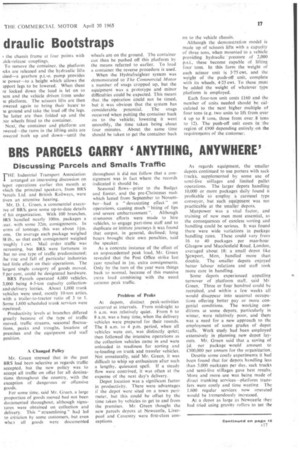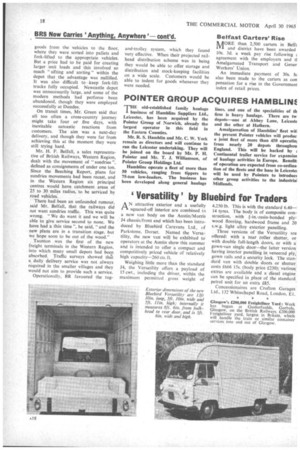BRS PARCELS CARRY 'ANYTHING, ANYWHERE'
Page 19

Page 20

If you've noticed an error in this article please click here to report it so we can fix it.
Discussing Parcels and Smalls Traffic
THE Industrial Transport Association arranged an interesting discussion on Iepot operations earlier this month at vhich the principal speakers, from FIRS ,arcels Ltd. and British Railways, were Uven an attentive hearing.
Mr. D. L. Green, a commercial execuive of BRS,gave some up-to-date details if his organization. With 100 branches, 3RS handled nearly 100m. packages a rear, with sonic 32m. consignments. In erms of tonnage, this was about .ons. On average each package weighed 38.1b., so that each consignment weighed oughly 1 cwt. Mail order traffic was .ncreasing, but BRS were fortunate in :hat no one type of traffic predominated; he 'rise and fall of particular industries had little effect on their oPerations. The largest' single category of goods moved, 9. Per cent, could be' designated hardware.
BRS Parcels operated 4,000 vehicles, 3,000 being 4-5-ton capacity collectionand-delivery lorries. About 1,000 trunk vehicles were used, mostly 10-ton artics, with a trailer-to-tractor 'ratio of 3 to I. Some 1,600 scheduled trunk services were operated.
Productivity levels at branches differed greatly because of the type of traffic moved, traffic streams, seasonal fluctuations, peaks and troughs, location of premises and the equipment and staff position.
A Changed Policy Mr. Green stressed that in the past BRS had been selective as regards traffic accepted, but the new policy was to accept all traffic on offer for all destinations throughout the country, with the exception of dangerous or offensive goods.
For some time, said Mr. Green. a large proportion of goods moved had not been documented throughout. although signatures were obtained on collection and delivery. This " streamlining " had led to criticism by some customers, but even when all goods were documented throughout it did not follow that a consignment was in fact where the records indicated it should be.
Seasonal flows—prior to the Budget and Easter, and the pre-Christmas rush which lasted from September to November--had a "devastating effect" on operations, causing much "biting of lips and severe embarrassment ". Although strenuous *efforts were made to hire vehicles, to engage part-time staff and to duplicate or initiate journeys it was found that output, in general, declined; long hours brought their own penalties, said the speaker.'
As a concrete instance of the effect of an unprecedented peak load, Mr. Green revealed that the Post Office strike last year resulted in +m. extra consignments. Only by the turn of the year were things back to normal, because of this massive extra load combining with the usual autumn peak traffic.
Problem of Peaks At depots, distinct peak-activities occurred at intervals. From midnight to 6 a.m. was relatively quiet. From 6 to 8 a.m. was a busy time, when the delivery vehicles were prepared for their rounds. The 8 a.m. to 4 p.m. period, when all vehicles were out, was distinctly quiet; then followed the intensive operations as the collection vehicles came in and were unloaded in readiness for sorting and re-loading on trunk and transfer vehicles. Not unnaturally, said Mr. Green, it was difficult to whip up enthusiasm after such a lengthy, quiescent spell. If a steady flow were contrived, it was often at the expense of the next day's delivery.
Depot location was a significant factor in productivity. There were advantages if the depot were sited on a town perimeter, but this could be offset by the time taken hy vehicles to get to and from the premises. Mr Green thought the new parcels depots at Newcastle, Liverpool and Coventry were first-class conceptions.
As regards equipment, the smaller depots continued to use porters with sack trucks, supplemented by some use of semi-live stillages and limited pallet operations. The larger depots handling 10,000 or more packages daily found it profitable to .emplay a carousel type conveyor, hut such equipment was not practicable at the smaller depots.
Manpower Was a vital factor, and training of new men most essential, as the consequences of careless sorting and handling could be serious, It was found there were wide variations in package handling rates. These could vary from 16 to 40 packages per man-hour. Glasgow and Macclesfield Road. London, averaged about 18; a small depot like riewport, Mon, :handled more than double. The smaller depots enjoyed better labour relations and staff took more care in handling.
Some depots experienced appalling turnover of platform staff, said Mr. Green. Three or four hundred could be recruited, and within a few weeks all would disappear into seasonal occupations offering better pay or more congenial conditions. The working conditions at some depots, particularly in winter, were relatively poor, and there was a need for a new approach to the employment of some grades of depot staffs. Work study had been employed extensively in planning new depot layouts. Mr. Green said that a saving of d. per package would amount to £300,000 per annum for the organization.
Despite some costly experiments it had been found that for depots handling less than 5.000 packages per day, sack trucks and semi-live stillages gave best results. More and more use was being made of direct trtinking services--platform transfers were costly and time wasting. The 1.600 regular services now operated would be tremendously increased.
At a depot at large as Newcastle they had tried using gravity rollers to get the goods from the vehicles to the floor, where they were sorted into pallets and fork-lifted to the appropriate vehicles. But a price had to be paid for creating larger unit loads and this involved so much "sifting and sorting" within the depot that the advantage was nullified. It was also difficult to keep fork-lift trucks fully occupied. Newcastle depot was unnecessarily large, and some of the modern methods had perforce been abandoned, though they were employed successfully at Dundee.
On transit times, Mr. Green said that all too often a cross-country journey might take four or five days, with inevitable sarcastic reactions from customers. The aim was a next-day delivery, and though they were far from achieving this at the moment they were still trying hard.
Mr. H. F. Belfall, a sales representative of British Railways, Western Region, dealt with the movement of "sundries defined as consignments of under one ton. Since the Beeching Report, plans for sundries movements had been recast, and in the Western Region six principal centres would have catchment areas of 25 to 30 miles radius, to be serviced by road vehicles.
There had been an unfounded rumour, said Mr. Belfall, that the railways did not want sundries traffic. This was quite wrong. "We do want it and we will be able to give service second to none. We have had a thin time ", he said, "and the new plans are in a transition stage, but we hope soon to be out of the wood."
Taunton was the first of the new freight terminals in the Western Region. into which many small depots had been absorbed. Traffic surveys showed thA a daily delivery service was not always required in the smaller villages and they would not aim to provide such a service,
Operationally, BR favoured the tug
and-trolley system, which they found very effective. When their projected railhead distribution scheme was in being they would be able to offer storage and distribution and stock-keeping facilities on a wide scale. Customers would be able to indent for goods whenever they were needed.
Belfast Carters' Rise
MORE than 2,500 carters in Belft and district have been awarded 10s. 3d. a week pay rise following agreement with the employers and ti Amalgamated Transport and Gener Workers' Union.
An immediate payment of 30s. Is also been made to the carters as con pensation for a rise in the Government index of retail prices.




































































































